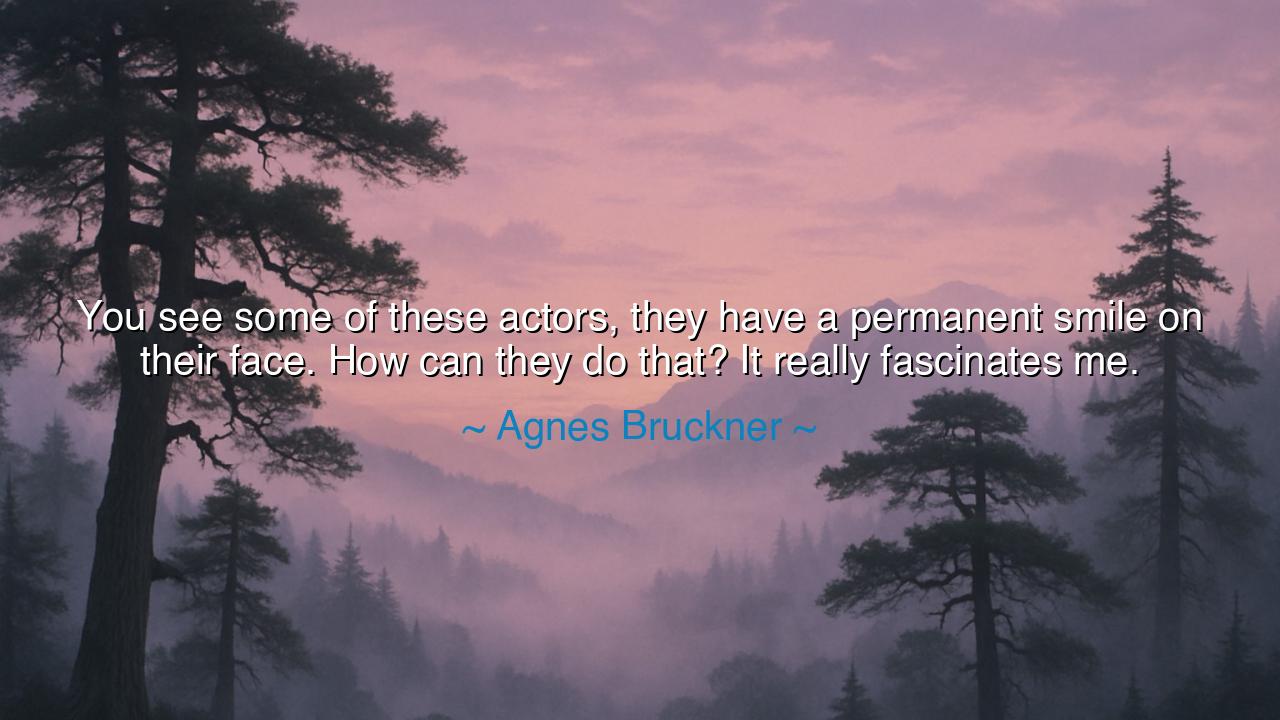
You see some of these actors, they have a permanent smile on
You see some of these actors, they have a permanent smile on their face. How can they do that? It really fascinates me.






The words of Agnes Bruckner carry with them the wonder of one who sees beneath appearances: “You see some of these actors, they have a permanent smile on their face. How can they do that? It really fascinates me.” What at first seems like a passing observation is in truth a meditation on the nature of masks and the mystery of human resilience. The smile, so small a gesture, can be both a shield and a beacon, concealing sorrows or projecting strength. To witness a face that carries it without faltering is to encounter something both alluring and unsettling—a paradox of endurance and performance.
The meaning of this saying lies in the tension between authenticity and artifice. The “permanent smile” may inspire admiration, but also suspicion. Is it the smile of true joy, flowing from the heart, or the smile of survival, crafted for the eyes of the world? Bruckner’s fascination is our own: we marvel at those who can maintain the mask of happiness in every setting, even while we know from our own hearts how difficult it is to smile when storms rage within.
The ancients, too, reflected on this duality. In the theaters of Athens, actors wore masks, each painted with a fixed expression—joy, grief, rage, or serenity. These masks allowed them to convey universality, yet behind them stood men and women with lives of their own, unseen by the crowd. In much the same way, the modern “permanent smile” is a mask, whether worn by actors, leaders, or ordinary souls in their daily lives. Bruckner, gazing upon such masks, wonders not only at the performance but at the cost of holding it so long.
History offers us many examples of those who bore such masks. Consider Abraham Lincoln, remembered by many for his gentle humor and kind demeanor. Yet beneath his outward calm, he carried the weight of depression and loss. His “smile” was not permanent, yet his public face often bore a steadiness that inspired hope. This teaches us that the smile can serve as a gift to others, even when it is not born of ease. The fascination Bruckner speaks of is not simply with the smile itself, but with the strength of spirit required to sustain it.
And yet, there is danger in the “permanent smile.” For if one forgets to set aside the mask, the soul beneath may wither. To deny pain is to deny growth; to pretend endlessly is to lose the distinction between truth and performance. Thus, while we may admire those who smile without cease, we must also remember the wisdom of balance—that there is a time for laughter, but also a time for tears. A smile that never breaks may conceal a heart that is burdened, longing to be seen.
The origin of this truth lies in the human longing for connection. We wear smiles so that others may not be troubled by our grief, or so that we may find favor in their eyes. Actors, more than most, live within this cycle, trained to embody joy even when their own lives falter. But this is not confined to the stage—each of us, in our own way, has worn the “permanent smile” to make peace, to protect ourselves, or to shield loved ones. It is both a burden and a skill, both noble and dangerous.
The lesson, then, is this: let your smile be both gift and truth. Do not scorn those who can wear it unfailingly, for they may be offering it as a light to others. Yet do not chain yourself to it if your soul longs to rest. In practice, this means smiling as an act of generosity, but also granting yourself the freedom to express pain when needed. Honor authenticity as much as resilience, for both are marks of true strength.
So let Agnes Bruckner’s wonder guide you: marvel at the “permanent smile,” but do not envy it blindly. Learn to use your own smile wisely—as a balm for the world, yet not as a prison for yourself. For the greatest beauty lies not in endless performance, but in the harmony of honesty and joy, of strength and vulnerability. And when your smile shines, let it be the kind that is not painted on, but that flows freely from a heart at peace.






AAdministratorAdministrator
Welcome, honored guests. Please leave a comment, we will respond soon